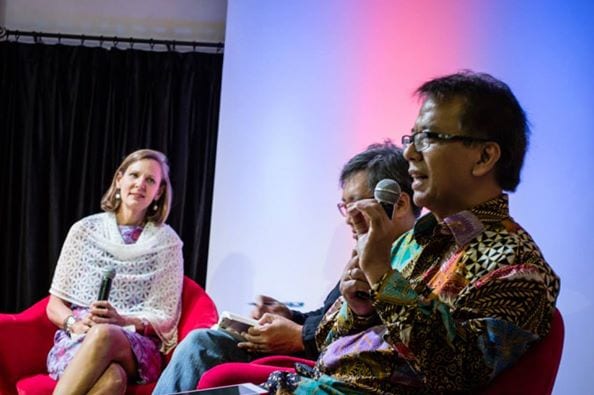
What’s the secret to public diplomacy and how do you measure its impact?
Although I spent the summer in Indonesia working on my project on journalism and Islam, I’ve also been up to some public diplomacy – most recently two weeks ago, when I launched a collection of my Email Dari Amerika columns at @America – an outpost of the Public Affairs Section of the U.S. Embassy located in a fancy shopping mall in Jakarta. It was a lot of fun. Here’s a link to the video, but the photos are more interesting because they’re in English 🙂 The Deputy Chief of Mission spoke, which added a nice note of gravitas to what might otherwise have been a discussion of snow, Valentine’s Day, and my parrot.
Email Dari Amerika is not an academic book, but writing those weekly columns for three years took a lot of effort, and I’m proud of what I accomplished. I had met Dhimam Abror, the editor of Surya newspaper, on a U.S. Government speaking trip back in 2006, and we became friends. Later, he asked if I’d write a weekly column, and I said no – that my Indonesian wasn’t good enough, that I didn’t want to offer superficial commentary on current events, and that I wasn’t a very fast writer. Dhimam observed that I wrote emails very quickly, and suggested that I write a weekly “Email From America” of 600 words about my life in the U.S. So I did.
I’m certainly an unusual American, but the column turned out to be fun to write, and I developed quite a fan club. The real challenge was filtering complicated ideas through my limited vocabulary. I tried to think up topics that Indonesians would find interesting – what snow is like, Valentine’s Day, what it was like to be on the Mall during Obama’s inauguration.
I had a great editor who fixed up my grammar but didn’t change my sentence structure or syntax, so it still sounds like me. It all ended shortly after Dhimam left the newspaper, but Yayasan Pantau, a journalism training institute in Jakarta where I’ve been teaching workshops for the past 14 years, decided to publish a collection of them after I posted a translation of my “Valentine’s Day” column on Facebook. The fatwa against celebrating Valentine’s Day really annoyed me – as you know, in the U.S. Valentine’s Day is hardly an excuse for vice; in fact, the people who probably enjoy it the most are school kids.
There’s no secret to Public Diplomacy; it’s really connecting people to people, being sensitive to others, and demonstrating that all of us have far more in common than we realize. The problem is that when budgets get tightened, public diplomacy programs are among the first to go. In recent years, I’ve been told countless times “we’d love to have you as a speaker, but we just don’t have the budget.”
The U.S. government investment that led to Email Dari America was two days of speaker honorarium plus travel expenses from Jakarta – well under $1,000. As one former Public Affairs Officer with whom I’ve worked put it, “Glad we could send you on speaker and Fulbright programs to Indonesia, Malaysia and beyond. You have increased the value of our modest investments exponentially!”
It’s often hard to measure the impact of public diplomacy, but as the Press Attaché who invited me to Surabaya eight years ago recently wrote, “You have made my day! Now that is a real tangible impact! Seriously!”



